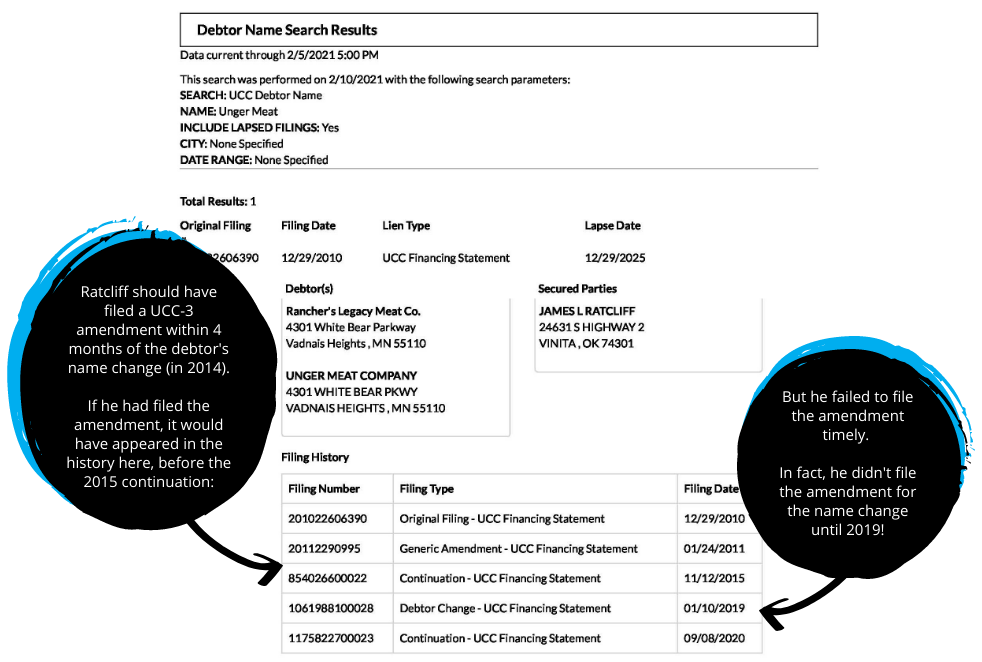
UCC 9-503(a), Its Frenemy 9-506, and the Fate of One Creditor’s Security Interest
In a recent Chapter 12 bankruptcy case, two creditors competed for interest in a piece of farm equipment: a 7215R Tractor. On the UCC Financing Statements, one creditor listed the debtor’s name as it appeared on the unexpired driver’s license, the other creditor did not. Welcome to today’s edition of “The Tractors & Tribulations of UCC 9-503.”
What’s in a Name under UCC 9-503(a)?
Article 9 has clear rules. A big one, and the one that is often flubbed, is compliance with UCC 9-503(a). You must correctly list the debtor’s name on the Financing Statement; whether it is a registered entity or an individual. Article 9 says if it is a Registered Entity, then list the name on the Financing Statement as it appears in the public organic record. If it is an individual, it will be Alternative A or B. Under Alternative A, if the debtor holds an unexpired driver’s license, the Financing Statement must list the debtor’s name as it appears on the unexpired driver’s license. And under Alternative B, the debtor’s driver’s license name, the debtor’s actual name or the debtor’s surname and first personal name may be used on the Financing Statement.
Fail to comply with UCC 9-503(a)? Then be prepared to meet 9-503’s frenemy: UCC Article 9-506(b). That’s right, “Seriously Misleading.”
According to UCC Article 9-506(b), a Financing Statement is seriously misleading if a search for the debtor’s legal name does not reveal the filing.
9-506 EFFECT OF ERRORS OR OMISSIONS
(b) [Financing statement seriously misleading.]
Except as otherwise provided in subsection (c), a financing statement that fails sufficiently to provide the name of the debtor in accordance with Section 9-503(a) is seriously misleading.
The Case of Wilson Jerry Wynn aka Jerry W Wynn
The case, IN RE WYNN, Bankr. Court, MD Georgia 2021, is an all too familiar instance of failing to correctly identify an individual debtor on a UCC Financing Statement.
In 2013, the debtor Wilson Jerry Wynn (Wynn) entered into a security agreement with Deere & Company (Deere) for the purchase of a 7215R tractor. Deere, in turn, filed a UCC and listed the debtor’s name as “Jerry W Wynn.” Deere later filed an amendment in 2015 and listed the debtor as “Wilson Jerry Wynn.”
In 2014, Wynn entered into an agreement with AgGeorgia Farm Credit, ACA (AgGeorgia) for a loan. The collateral was farm equipment and expressly included the 7215R tractor. According to the court opinion, at the time the loan/agreement was executed, Wynn provided documentation to AgGeorgia which indicated Deere had a UCC filed on the tractor. AgGeorgia filed a UCC and listed the debtor’s name as “Wilson Jerry Wynn.”
Key: from 2011 to 2016, Wynn possessed an unexpired Georgia driver’s license, which identified him as “Wilson Jerry Wynn.”
In 2017, Wynn filed for Chapter 12 and ultimately, AgGeorgia filed a complaint to determine the validity of Deere’s security interest.
The Court Considered
Here’s an excerpt from the court opinion:
“Georgia law requires… for a financing statement to be effective, it must include the debtor’s name… if the Debtor has a Georgia driver’s license, the financing statement should list the Debtor’s name as listed on the driver’s license. According to Georgia law, however,
[i]f a search of the records of the filing office under the debtor’s correct name, using the filing office’s standard search logic, if any, would disclose a financing statement that fails sufficiently to provide the name of the debtor in accordance with subsection (a) of Code Section 11-9-503, the name provided does not make the financing statement seriously misleading.
O.C.G.A § 11-9-506(c). Deere listed the Debtor’s name on its original financing statement as “Jerry W. Wynn,” but the Debtor’s name as listed on his driver’s license was Wilson Jerry Wynn… Although Deere listed the Debtor’s name incorrectly on its initial financing statement, if Deere’s financing statement would appear in a search of the Debtor’s correct name, the financing statement would still have priority over subsequent correctly filed financing statements, including AgGeorgia’s.”
So, the question becomes: Would Deere’s Financing Statement appear in a search using Wynn’s correct name?
Turns out, Deere and AgGeorgia performed two different search types. AgGeorgia performed an exact name search and Deere performed a certified search. The court clarified the difference between a certified search and an exact name search.
“A certified search… adds a second step beyond the exact name search to cross-reference the file numbers of amended financing statements and returns them in addition to the original financing statements; the results of a certified search include more results than the exact name search would have disclosed.”
Seems Deere’s search was more thorough, which is good, right? Well, it may have been more thorough, but it is not the standard search logic used in Georgia. Georgia has two standard search logics: exact search and stem search.
The exact name search would not have revealed Deere’s original 2013 UCC, though it would have revealed the 2015 amendment. Unfortunately for Deere, AgGeorgia properly perfected its security interest in 2014, giving AgGeorgia priority over Deere.
But Wait, AgGeorgia Knew about Deere’s Interest in the Tractor
Earlier I mentioned Wynn provided AgGeorgia with documentation about Deere’s interest in the tractor. Deere argued it has priority, because AgGeorgia knew about Deere’s interest. But the argument was futile. “This Court finds that, under Georgia law, actual notice does not affect the priority of liens and the first to perfect rule governs, giving AgGeorgia’s lien on the Tractor priority over Deere’s.”
AgGeorgia wins.








